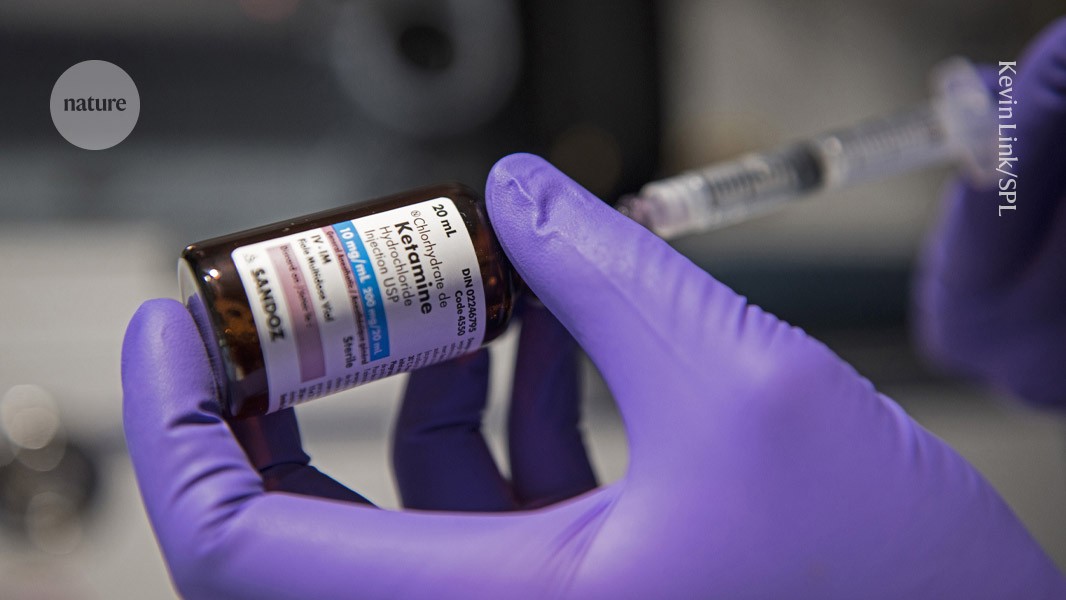Ketamine for depression: slow-release pills could make treatment more accessible

A ketamine-containing tablet could be a convenient alternative to intravenous treatments, with fewer unpleasant side effects

Conventionally, ketamine has to be injected by professionals, and can only be taken under medical supervision.Credit: Kevin Link/SPL
Ketamine is perhaps best known as a horse tranquilizer and a party drug, but over the past few years, scientists have increasingly explored the drug’s potential as a treatment for severe depression. The drug is typically administered intravenously in a specialized clinic, but a new slow-release tablet could help to make it accessible to more people.
In a study published in Nature Medicine on 24 June1, researchers found that a tablet containing ketamine had antidepressant effects in more than 150 people who had not responded to other drugs.
“The fact that potentially you could dose this at home if you wanted to, it suddenly makes this a much easier medication to give out,” says the study’s lead author Paul Glue, a psychiatrist at the University of Otago in Dunedin, New Zealand.
Avoiding adverse effects
Some doctors already use ketamine to treat depression, and previous studies have found it can produce considerable improvements in people’s symptoms.
The drug is typically administered intravenously or through a nasal spray. Both of these methods can cause side effects, including high blood pressure, elevated heart rate and dissociation, which causes people to feel disconnected from their body and their surroundings.
Previous analyses have suggested that slow-release formulations of ketamine tend to have fewer side effects2. Glue and his colleagues therefore proposed that an extended-release tablet could be a well-tolerated and convenient option for people with severe or treatment-resistant depression. They developed a ketamine-containing pill called R-107 and gave it to 231 study participants, all of whom had a major depressive disorder that had not improved despite trying at least two antidepressants.
In the first part of the study, all 231 participants received a daily 120-milligram dose of R-107 for five days. After eight days, participants whose depression symptoms hadn’t improved left the study, leaving 168 to complete the second part. This consisted of a 12-week-long clinical trial in which participants took either placebo tablets, or one of four doses of R-107 (30, 60, 120 or 180 milligrams) twice weekly.
After a total of 13 weeks of treatment, 71% of participants taking the placebo relapsed (experienced moderate depression symptoms), compared with 43% of those who received the highest dose of R-107. Participants experienced minimal side effects and no changes in blood pressure, and few reported feelings of sedation or dissociation.
“They seem to have demonstrated that the top dose of oral extended-release ketamine resulted in a sustained antidepressant effect,” says Rupert McShane, a psychiatrist at the University of Oxford, UK. “It certainly merits phase III investigation.” He adds that it will be important to do studies focused on safety to investigate “whether higher doses than are prescribed result in liking or craving, or appear to have abuse potential”. This is a concern among researchers, given ketamine’s popularity as an illegal party drug.
Shatter-proof pill
To mitigate some of these concerns, R-107 was designed to be exceptionally hard and difficult to shatter, meaning that it couldn’t be crushed up and snorted (a typical practice for recreational users). “I’m hoping there will be other really good formulations that can help make this easier to access for patients, and maybe allow doctors or psychiatrists to feel much more comfortable using this clinically,” says Glue.
Further studies are being designed to explore the effectiveness of ketamine for treating other psychiatric conditions, including alcohol use disorders. Preliminary research suggests that taking the drug can help to reduce people’s cravings for alcohol3.
“None of the medications that we have worked for people addicted to alcohol particularly well,” says Glue. “So, if you could somehow jumpstart their abstinence with ketamine, that would be amazing.”
doi: https://doi.org/10.1038/d41586-024-02127-9
This story originally appeared on: Nature - Author:Helena Kudiabor


















